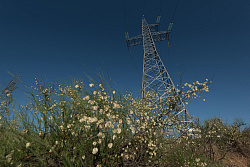Rosseti South reduced overdue accounts receivable by 1.1 billion rubles in 9M 2023
Since the beginning of 2023, Rosseti South PJSC reduced overdue accounts receivable of customers for electric power transmission services by 24.2% (1.1 billion rubles). On October 1 of this year it amounted to 3.5 billion rubles. In the total structure of debts, the share of regional guaranteed suppliers of electricity is 21%, energy sales companies - 20%, direct bankrupt consumers - 21%.
The change of this index is due to the implementation of the current debt restructuring agreement with the guarantee supplier Volgogradenergosbyt PJSC in Volgograd region, as well as the settlement of disputes on services and losses in court and pre-trial proceedings. This company reduced its debt by 67% to 0.3 billion rubles in nine months.
Overdue accounts receivable decreased to 59 % to 0.3 billion rubles in the Astrakhan region. This is due to the repayment by the guaranteeing supplier Astrakhan Energy Retail Company, PJSC of overdue debts and settlement of disagreements on services and losses in court and pre-trial proceedings.
Overdue accounts receivable of customers in the Rostov region increased by 46%, reaching 0,8 billion rubles by the beginning of October. The main reason for the growth of this number is an increase of 176 million rubles in the debt of State Unitary Enterprise “Management of Water Supply Systems Development” in the Rostov region. This company carries out regulated activities on water supply and sanitation in the region.
The decrease in overdue receivables of customers in the Republic of Kalmykia amounted to 25%, down to 0.3 billion rubles at the end of the reporting period and was due to the repayment of debts of Kalmenergosbyt JSC under bankruptcy proceedings.
Despite the positive dynamics, customers' overdue receivables for electricity transport services remain unacceptably high. This is a limiting factor for the development and modernization of the network complex, while the need of regional residents to connect to the infrastructure is increasing and the need for the introduction of modern domestic technologies is growing. The systematic solution of these problems is impossible without timely payments for the services provided.
В связи с проведением профилактических работ
интерактивная карта «Россети Юг» временно недоступна.
Приносим свои извинения.
Информацию по ЦП можно получить на карте ПАО «Россети»
по ссылке:
https://портал-тп.рф/platform/portal/tehprisEE_centry_pitania





